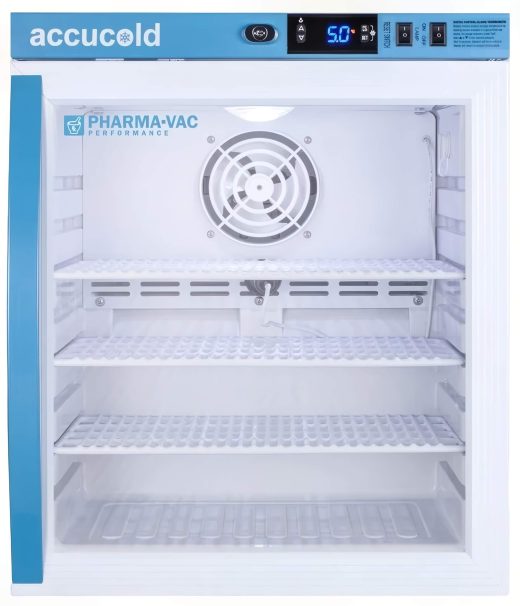Quick Ship Surgical Tables and Stretchers: Auxo Medical’s Commitment to Quality and Efficiency
At Auxo Medical, we understand the critical importance of having reliable, high-quality medical equipment available at a moment’s notice. That’s why we’re proud to offer our Quick Ship program for surgical tables and stretchers. This initiative ensures that healthcare facilities can access top-of-the-line equipment without the usual wait times, allowing them to provide the best possible care to their patients.
Our Stretcher Selection
We offer a diverse range of stretchers to meet the varied needs of healthcare facilities. Let’s take a closer look at our premium stretcher options:
1. Stryker 1501 Renaissance Series Stretcher with IV Pole (AM-S1501)
 The Stryker 1501 Renaissance Series stretcher is a testament to innovation in patient transport. This versatile stretcher comes equipped with an IV pole, making it ideal for patients requiring intravenous therapy during transport. The Renaissance Series is known for its durability and ease of maneuverability, allowing healthcare professionals to transport patients safely and efficiently.
The Stryker 1501 Renaissance Series stretcher is a testament to innovation in patient transport. This versatile stretcher comes equipped with an IV pole, making it ideal for patients requiring intravenous therapy during transport. The Renaissance Series is known for its durability and ease of maneuverability, allowing healthcare professionals to transport patients safely and efficiently.
Key features of the Stryker 1501 Renaissance Series stretcher include:
- Robust construction for long-lasting performance
- Smooth-rolling casters for easy navigation through hospital corridors
- Adjustable height settings to accommodate various patient transfer scenarios
- Integrated IV pole for convenient medication administration during transport
- Comfortable patient surface with pressure-reducing properties
2. Stryker Renaissance Series Stretcher with IV Pole (AM-SRS-IV)
 The Stryker Renaissance Series Stretcher with IV Pole (AM-SRS-IV) epitomizes advanced medical transport solutions, designed for optimal patient comfort and caregiver efficiency. Engineered with precision, this stretcher combines robust construction with user-friendly features, ensuring seamless mobility and stability. The integrated IV pole offers a convenient solution for intravenous therapy, minimizing the need for additional equipment and streamlining patient care. Ergonomically designed, the stretcher boasts adjustable height settings, padded surfaces, and intuitive controls, facilitating ease of use in various clinical environments. The Stryker Renaissance Series Stretcher is an indispensable asset in emergency rooms, operating theaters, and patient transport scenarios, reflecting a commitment to quality and innovation in medical equipment.
The Stryker Renaissance Series Stretcher with IV Pole (AM-SRS-IV) epitomizes advanced medical transport solutions, designed for optimal patient comfort and caregiver efficiency. Engineered with precision, this stretcher combines robust construction with user-friendly features, ensuring seamless mobility and stability. The integrated IV pole offers a convenient solution for intravenous therapy, minimizing the need for additional equipment and streamlining patient care. Ergonomically designed, the stretcher boasts adjustable height settings, padded surfaces, and intuitive controls, facilitating ease of use in various clinical environments. The Stryker Renaissance Series Stretcher is an indispensable asset in emergency rooms, operating theaters, and patient transport scenarios, reflecting a commitment to quality and innovation in medical equipment.
3. Gendron 1190-231 Bariatric Stretcher (AM-G1190-132B)
 We’re proud to offer the Gendron 1190-231 Bariatric Stretcher, a specialized transport solution designed for bariatric patients. This stretcher addresses the unique challenges faced by healthcare facilities in safely and comfortably transporting larger patients.
We’re proud to offer the Gendron 1190-231 Bariatric Stretcher, a specialized transport solution designed for bariatric patients. This stretcher addresses the unique challenges faced by healthcare facilities in safely and comfortably transporting larger patients.
Notable features of the Gendron 1190-231 Bariatric Stretcher include:
- Higher weight capacity to accommodate bariatric patients
- Wider patient surface for improved comfort and safety
- Reinforced frame for enhanced stability
- Specialized wheels for smooth transport and maneuverability
4. Pedigo 5400 W Stretcher, Side Brake Only (AM-P5400W)
 The Pedigo 5400 W Stretcher is a reliable and efficient transport solution featuring a side brake system. This model is designed for healthcare professionals who prefer the accessibility and ease of use provided by side brakes.
The Pedigo 5400 W Stretcher is a reliable and efficient transport solution featuring a side brake system. This model is designed for healthcare professionals who prefer the accessibility and ease of use provided by side brakes.
Key advantages of the Pedigo 5400 W Stretcher include:
- Intuitive side brake system for quick and easy operation
- Durable construction for long-term use in demanding healthcare environments
- Smooth-rolling casters for effortless patient transport
- Adjustable height settings to facilitate safe patient transfers
- Comfortable patient surface with infection control-friendly materials
Our Surgical Table Collection
In addition to our stretcher offerings, we provide a selection of advanced surgical tables to meet the diverse needs of modern operating rooms. Let’s explore our surgical table options in detail:
1. Steris CMAX Surgical Table (AM-CMAX)
 The Steris CMAX Surgical Table represents the pinnacle of surgical table technology. This advanced table is designed to provide optimal patient positioning and accessibility for a wide range of surgical procedures.
The Steris CMAX Surgical Table represents the pinnacle of surgical table technology. This advanced table is designed to provide optimal patient positioning and accessibility for a wide range of surgical procedures.
Standout features of the Steris CMAX Surgical Table include:
- Exceptional weight capacity to accommodate a variety of patient sizes
- 360-degree rotation capability for enhanced surgical access
- Powered articulation for precise patient positioning
- Radiolucent tabletop for improved imaging capabilities
- Intuitive control systems for effortless operation during procedures
2. Steris Amsco Model 3085 Surgical Table (AM-3085SP)
 The Steris Amsco Model 3085 Surgical Table is a versatile and reliable option for various surgical specialties. Known for its durability and ease of use, this table has been a staple in operating rooms for years.
The Steris Amsco Model 3085 Surgical Table is a versatile and reliable option for various surgical specialties. Known for its durability and ease of use, this table has been a staple in operating rooms for years.
Key features of the Steris Amsco Model 3085 Surgical Table include:
- Robust construction for long-lasting performance
- Manual and powered articulation options for flexible positioning
- Radiolucent tabletop sections for enhanced imaging capabilities
- Wide range of available accessories for procedure-specific customization
- User-friendly controls for efficient operation during surgeries
3. Skytron Hercules 6701 Surgical Table (AM-SKYTRON-6701)
 The Skytron Hercules 6701 Surgical Table lives up to its name, offering exceptional strength and versatility for even the most demanding surgical procedures. This table is designed to provide optimal patient positioning and surgeon access across a wide range of specialties.
The Skytron Hercules 6701 Surgical Table lives up to its name, offering exceptional strength and versatility for even the most demanding surgical procedures. This table is designed to provide optimal patient positioning and surgeon access across a wide range of specialties.
Notable features of the Skytron Hercules 6701 Surgical Table include:
- High weight capacity to accommodate bariatric patients
- 360-degree rotation for improved surgical site access
- Powered articulation with memory positioning functions
- Carbon fiber tabletop for superior radiolucency
- Intuitive hand and foot control options for seamless operation
4. Skytron 3600B Surgical Table (AM-SKYTRON-3600B)
 Skytron 3600B Surgical Table offers a perfect balance of functionality and affordability. This table is designed to meet the needs of various surgical specialties while providing excellent value for healthcare facilities.
Skytron 3600B Surgical Table offers a perfect balance of functionality and affordability. This table is designed to meet the needs of various surgical specialties while providing excellent value for healthcare facilities.
Key advantages of the Skytron 3600B Surgical Table include:
- Versatile positioning capabilities for multiple surgical disciplines
- Manual and powered articulation options
- Durable construction for long-term reliability
- Compatible with a wide range of Skytron accessories
- User-friendly controls for efficient operation during procedures
Our Commitment to Quality and Service
When you choose Auxo Medical for your surgical tables and stretchers, you’re not just getting premium equipment – you’re partnering with a team dedicated to your success. We take pride in offering comprehensive support and service to ensure that your equipment performs at its best throughout its lifecycle.
Our team of experienced professionals is always ready to assist you with:
- Product selection guidance to ensure you choose the right equipment for your facility’s needs
- Technical support for seamless integration and operation of your new equipment
- Maintenance and repair services to keep your equipment in top condition
- Training and education resources to help your staff maximize the potential of your new surgical tables and stretchers
Special Offer for Service Agreement Holders
We value our long-term partnerships with healthcare facilities, and we’re excited to offer a special discount to our service agreement holders. With any active service agreement, you’ll receive a 5% discount on any equipment purchase. This offer is our way of saying thank you for your continued trust in Auxo Medical.
To take advantage of this exclusive offer and lock in your discount, we encourage you to contact our sales team today. Our knowledgeable representatives will be happy to discuss your equipment needs and help you find the perfect solutions for your facility.
Order Your Stretchers and Surgical Tables from Auxo Medical
At Auxo Medical, we’re more than just an equipment provider – we’re your partner in delivering exceptional patient care. Our Quick Ship program for surgical tables and stretchers demonstrates our commitment to supporting healthcare facilities with top-quality equipment when they need it most.
From versatile stretchers like the Stryker Renaissance Series to advanced surgical tables like the Steris CMAX, we offer a comprehensive range of options to meet the diverse needs of modern healthcare environments. Our dedication to quality, service, and innovation ensures that you’ll always have the tools you need to provide the best possible care to your patients.
We invite you to explore our full range of surgical tables and stretchers and experience the Auxo Medical difference for yourself. Contact our sales team today to learn more about our Quick Ship program, discuss your equipment needs, or take advantage of our exclusive discount for service agreement holders.
Together, we can elevate the standard of patient care and create more efficient, effective healthcare environments. Choose Auxo Medical for your surgical tables and stretchers, and let us help you build a foundation



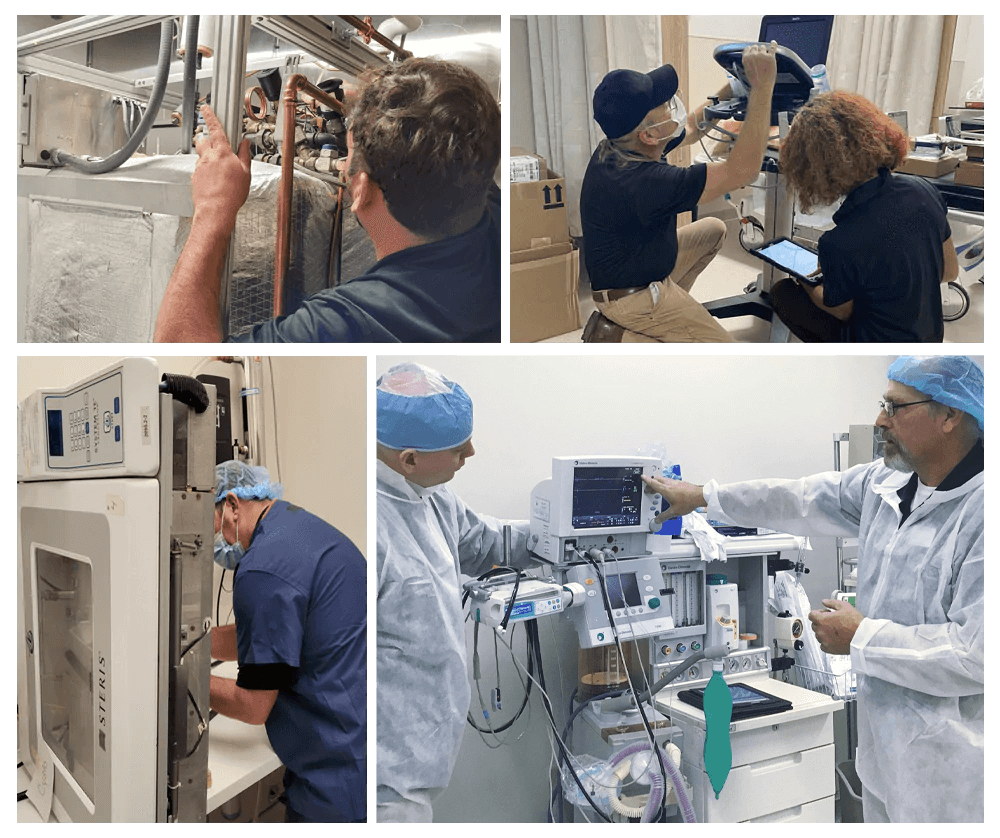 Biomedical Equipment Inspections and Repairs
Biomedical Equipment Inspections and Repairs
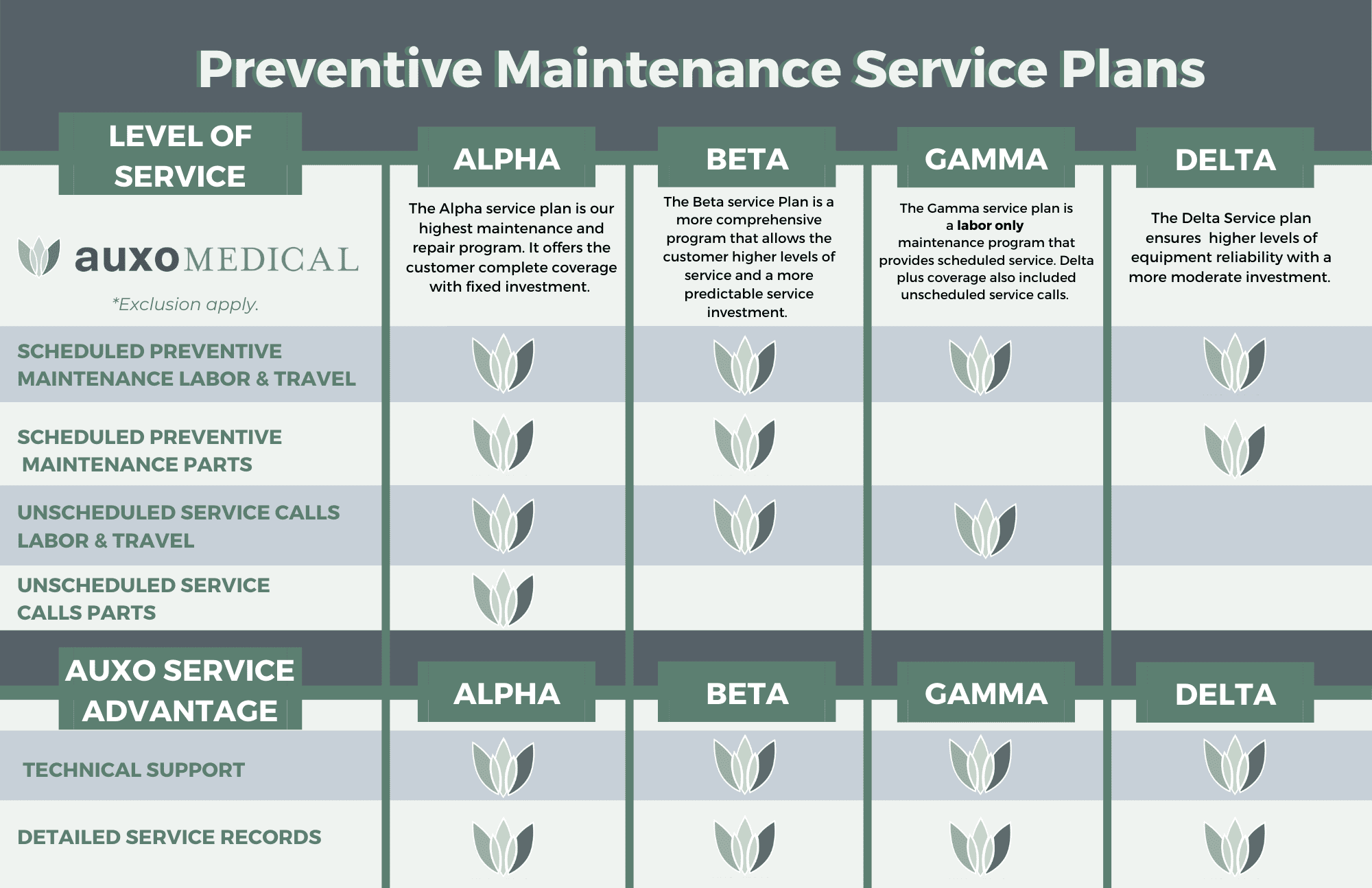 FAQ (Frequently Asked Questions)
FAQ (Frequently Asked Questions)


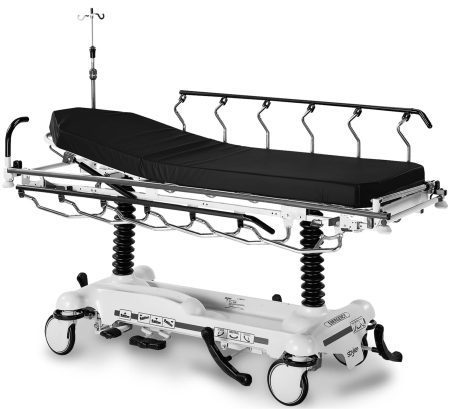
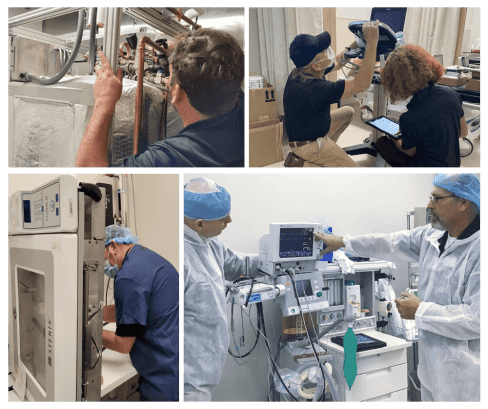
 The Accucold 18 Cu.Ft. Upright Vaccine Refrigerator is purpose-built to address the specific storage requirements of vaccines, medications, and pharmacy applications. It is designed to meet the guidelines set by the CDC/VFC and is certified to the NSF/ANSI 456 Vaccine Storage Standard. Let’s explore the key features that make this refrigerator an ideal choice for healthcare professionals.
The Accucold 18 Cu.Ft. Upright Vaccine Refrigerator is purpose-built to address the specific storage requirements of vaccines, medications, and pharmacy applications. It is designed to meet the guidelines set by the CDC/VFC and is certified to the NSF/ANSI 456 Vaccine Storage Standard. Let’s explore the key features that make this refrigerator an ideal choice for healthcare professionals. The Accucold 18 Cu.Ft. Upright Vaccine Refrigerator is equipped with a suite of alarms to ensure safety and reliability. These alarms include temperature deviation, open door, power failure, and sensor disruption alarms. These alerts help healthcare professionals quickly identify and address any issues that may affect the integrity of the stored vaccines.
The Accucold 18 Cu.Ft. Upright Vaccine Refrigerator is equipped with a suite of alarms to ensure safety and reliability. These alarms include temperature deviation, open door, power failure, and sensor disruption alarms. These alerts help healthcare professionals quickly identify and address any issues that may affect the integrity of the stored vaccines.


